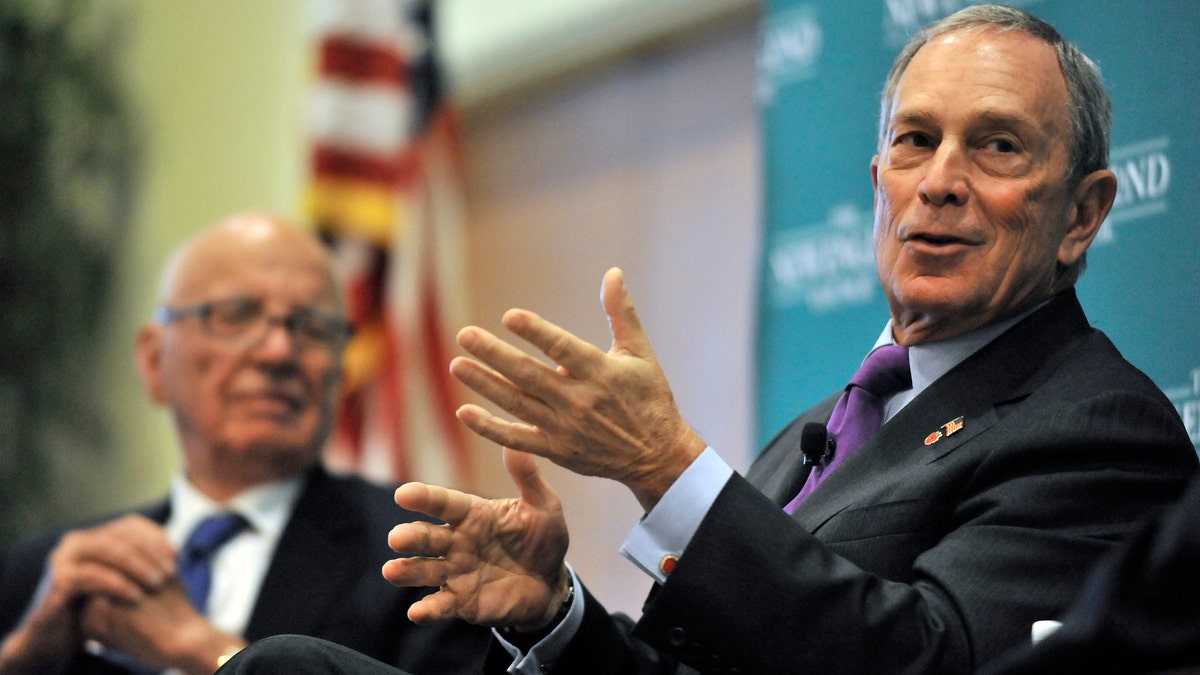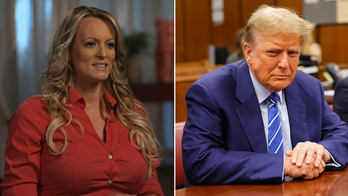
From left, News Corporation CEO Rupert Murdoch, looks on as New York Mayor Michael Bloomberg speaks during a forum on The Economics and Politics of Immigration in Boston on Tuesday. (AP2012)
New York City Mayor Michael Bloomberg wants the presidential candidates to get serious about immigration reform.
Taking his immigration reform push on tour, Bloomberg stopped in Chicago and Boston this week, where he made high-profile appearances with News Corporation CEO Rupert Murdoch and President Barack Obama's former chief of staff Bill Daley, calling on the presidential candidates to debate the issue and offer detailed proposals.
A long time advocate of immigration reform, Bloomberg’s message hasn’t changed: he says immigration is good for the economy.
“America is committing economic suicide by failing to confront the issue of immigration reform,” Bloomberg said Monday at an immigration reform in Chicago, according to the Chicago Sun-Times.
Part of the mission behind Bloomberg’s appearances was to trumpet the results of a study from the Partnership for a New American Economy, a bipartisan coalition of business leaders and mayors that says opening the country’s borders and finding a solution for the estimated 11 million undocumented immigrants will help restart the economy.
The report, “Open for Business,” says immigrants started 28 percent of all U.S. businesses in 2011, though they account for only 12.9 percent of the population. Immigrants are twice as likely as the native-born to start a business, the study says.
Bloomberg hopes the research will prompt the presidential candidates to take more leadership on the immigration issue.
Murdoch, also a co-chair of the Partnership for a New American Economy, echoed Bloomberg’s sentiment in an appearance in Boston on Tuesday.
“It takes a little courage, but it can be done,” Murdoch said in a separate forum with Bloomberg in Boston on Tuesday, according to the New York Post. “Just tear up the spreadsheets and just do it.”
Bloomberg, a political independent and billionaire media tycoon, has long used economic arguments to forge a consensus among both Democrats and Republicans on the thorny immigration issue.
So far, however, he’s been unsuccessful. And it doesn’t appear that his frustrations will end any time soon.
Congress is locked in a stalemate and the issue has become highly politicized, with less than 90 days until November’s presidential election.
Mitt Romney took one of the most strident positions on immigration reform during the GOP primary, saying he would he would veto the DREAM Act. Romney supports expanding the system of legal immigration and “stapling green cards” to foreigners who study here on immigrant visas, but he has not offered a detailed proposal on how to address the situation of the undocumented.
He said he has favored tough crackdowns on illegal immigration that would prompt undocumented immigrants to “self-deport”—a catchword he reportedly dropped at the request of Republican Sen. John McCain, who told him it alienates Latino voters.
Since the primary, however, Romney has softened his stance, saying he favors a military-only version of the DREAM Act. His campaign now focuses on the economy and jobs, pointing out that most polls show those issues are more important to Latino voters than immigration.
Obama made a campaign pledge to address immigration reform and openly supports the DREAM Act, but his administration has made little progress on the issue. The DREAM Act passed the House of Representatives, but failed in the Senate in 2010.
Since then, Obama has pointed the finger at Republicans for the stalemate, without offering the outlines for a comprehensive reform. Few observers expect Congress to take up the controversial immigration issue in a presidential election year.
The Obama administration has also presided over the most deportations of any president in U.S. history, drawing criticism from reform advocates. Obama has set a new record for deportations for each year in office, with last year’s total reaching 396,906.
But Obama won praise from reform advocates for deferring deportation for immigrants brought here illegally as children. The new guidelines suspend deportations for a renewable two-year period for people under 31 years old who arrived here before age 16 and have no criminal record. Successful applicants may also apply for work authorization.
The policy change drew criticism from many conservatives, some of whom say that with 8 percent unemployment there aren’t enough jobs available for the native born, let alone hundreds of thousands of undocumented immigrants.
Bloomberg discounted such criticism Tuesday in Boston.
“People don’t come here to put up their feet and collect welfare,” Bloomberg said, according to the Post. “They come here to work. And if there are no jobs, they don’t come here."
Based on reporting by the Associated Press.
Follow us on twitter.com/foxnewslatino
Like us at facebook.com/foxnewslatino




